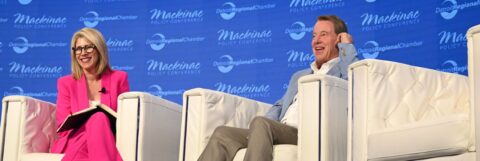With the rest of the world’s adoption of electric vehicles outpacing the U.S., MichAuto investor Ford Motor Company is playing the long game domestically and letting American consumers choose their vehicles as next-generation mobility evolves.
It’s led to a multi-pronged strategy that features compelling internal combustion engine vehicles, sister hybrid vehicles, and bundling vehicles with charging solutions and telematics software to accelerate productivity for commercial fleets while catering to both EV and AVs.
The flexible approach allows for addressing differing preferences between the retail and commercial customers as next-generation technology seeps into the driver experience at a more incremental pace than previously predicted by many industry insiders.
“By the time you get to full autonomy, frankly, people might not even notice, because so much of that (technology) will have been baked in along the way. I think that’s a much safer and much more logical way to introduce this as it turns out,” said Bill Ford, Ford’s Executive Chair.
The automotive icon shared his thoughts on the future of the industry and Detroit with columnist Carol Cain at the Detroit Free Press Breakfast Club Series on April 17. Sponsors included the Detroit Regional Chamber and MichAuto.
Here are four other takeaways:
Consumers should decide the evolution of EVs – not politicians.
“I never thought I’d see the day where our vehicles would become political footballs – but they are,” Ford told Cain as he explained the difference between Republican and Democratic views of EVs, and how it forces companies like Ford to “hedge its bets.”
“We shouldn’t let Washington decide, we should let customers decide,” he said, noting that people who adopt EVs and hybrids love the products and don’t want to go back, but that adoption will take shape in “fits and starts” and develop differently vehicle segment by segment based on what people want.
Uncertainty created by “political hurricanes” is an innovation killer.
The business planning involved in such a complex shift as that from ICE to EVs takes much longer than election cycles, requiring years- or decades-long investments in technology development spanning multiple elections.
The uncertainty created by the increasing political winds, or “political hurricanes” are a significant threat to innovation and undermine businesses and elected officials would better serve the country if they picked a path and stuck with it, explained Ford.
“We can do almost anything as a company and frankly as an industry, as long as we have some certainty towards where we’re headed,” said Ford. “The problem is when we’re whipsawed back and forth by politicians that it becomes really difficult for us because we can’t turn on a dime.”
We need to make Detroit more fun and interesting to beat out the competition for young talent.
For Ford, the Michigan Central project is all about retaining the younger talented generations and creating the vibrant, healthy community needed to ensure companies are positioned for success today and 120 years from now as technology evolves.
“I want our company to succeed and thrive into the future. And we can only do that if we’re in an amazing community where we’re raising kids who stay here and don’t leave,” said Ford, who touted how Michigan Central has already attracted 92 startups, 20 venture capital firms, and nearly $700 million in funding as it emerges into the innovation hub he envisioned when Ford purchased it.
A game of pool in the late 1970s helped shape the future of auto industry as Ford prepares to unveil the refurbished Michigan Central this summer.
Back home during the holidays decades ago, a recently graduated Bill Ford Jr. was shooting pool with his father – when they broached the subject of what was next for the younger Ford.
The conversation prompted the question if that future would include the family company. The elder Ford told his son only to join the company if it was what he was passionate about.
“So then we went back to playing pool and I joined the company. But it was great advice. And I sort of took stock every year. Is this really what I want to do? And you know, here I am 45 years later and the answer is still, yes.”
The rest is history – Bill Ford Jr., who is set to be enshrined in the Automotive Hall of Fame this year, started at the company in 1979, and has been an industry visionary moving the company and the Motor City forward, most recently through the rebirth of Detroit’s iconic train station.

